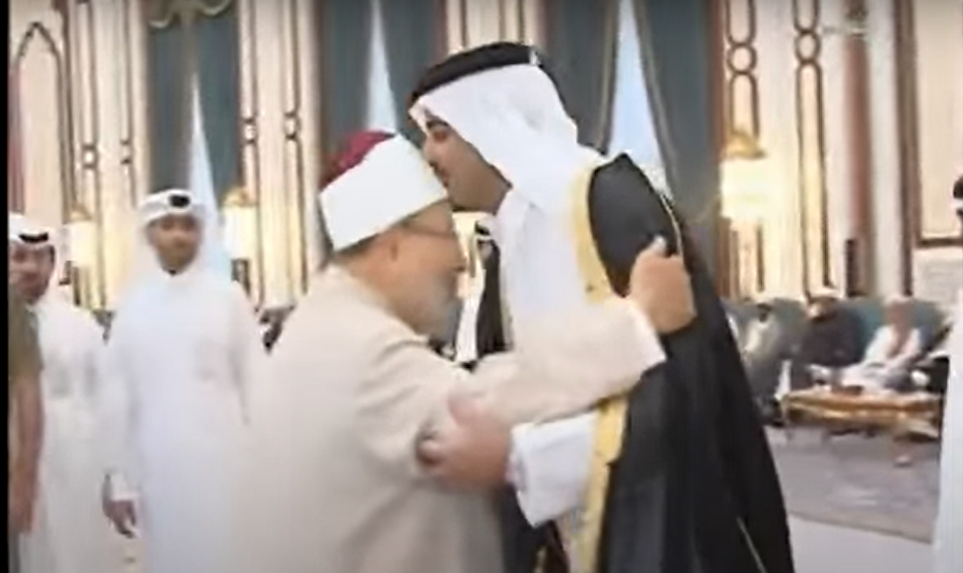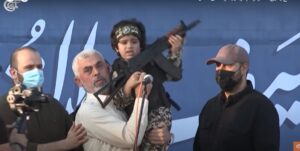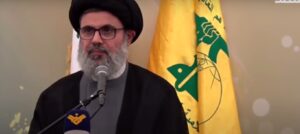Qatar’s ruler Sheikh Tamim bin Hamad dropped a “media bombshell” last week that shocked Qatar’s supporters in the Islamic world and the “Muslim Brotherhood” movement.
In an interview with the French newspaper Le Point, the ruler of Qatar disavowed any connection to the “Muslim Brotherhood” movement, from whose womb Sunni terrorist movements such as al-Qaeda, ISIS, Hamas, Islamic Jihad, etc. grew.
Sheikh Tamim bin Hamad vigorously denied any connection of his country to the “Muslim Brotherhood movement”.
In an interview with the French newspaper "Le Point" the ruler of Qatar, Sheikh Tamim bin Hamad, disclaimed any connection of his country to the "Muslim Brotherhood". pic.twitter.com/53xXs73zaZ
— יוני בן מנחם yoni ben menachem (@yonibmen) September 19, 2022
It was a vigorous denial that was clearly heard for the first time from the mouth of the Qatari ruler.
“Qatar deals with countries and governments and not with political parties, this relationship does not exist and there are no activists or members of the Muslim Brotherhood movement on the soil of Qatar or of groups related to it”, he stated.
He added: “We are an open country where a large number of people with different opinions and ideas pass through, we are a country and not a party, we deal with states and governments and not with political organizations”.
Qatar hosts on its territory the leaders of the “Muslim Brotherhood”, some of whom fled Egypt when President al-Sisi came to power, and the leadership of Hamas since it left Damascus in 2012 amid disagreements with Syrian President Bashar al-Assad.
It also hosts in Doha Sheikh Yousuf Qaradawi, the spiritual leader of the “Muslim Brotherhood” movement and expressed support for the ousted Egyptian president Mohammed Morsi, one of the leaders of the “Muslim Brotherhood”, who died in an Egyptian prison.
It uses its media, such as the “Al Jazeera” channel and several websites, to incite against Egypt, Saudi Arabia, the United Arab Emirates and Bahrain and to express support for the “Muslim Brotherhood” and Hamas.
The ruler of Qatar announced that his country has nothing to do with the "Muslim Brotherhood" movement in order to try and clean up the stain that stuck to his country as a state that supports terrorism.
— יוני בן מנחם yoni ben menachem (@yonibmen) September 19, 2022
The countries of the world do not buy the words of the Qatari ruler. pic.twitter.com/ggnqkgT7Wc
In 2017, the Arab Quartet (Egypt, Saudi Arabia, the United Arab Emirates and Bahrain) accused Qatar of supporting terrorism, and set 13 conditions for lifting the embargo and the political-economic blockade it imposed on it.
Qatar tried to be smart, in July 2017 Qatar announced the enactment of the anti-terror law and also published a terrorist list with 19 individuals and 8 entities, but these were individuals and entities associated with the Al-Qaeda and ISIS organizations and not the “Muslim Brotherhood”.
Sources in the Qatari opposition claimed that this list is fictitious and a definite “political exercise” and a public relations gimmick in an attempt to change the negative image it had in the eyes of the Trump administration and in the eyes of the world.
Qatar hosts on its territory the leaders of the "Muslim Brotherhood" movement, some of whom fled Egypt when President al-Sisi came to power, and the leadership of Hamas since it left Damascus.
— יוני בן מנחם yoni ben menachem (@yonibmen) September 19, 2022
It also hosts Sheikh Yusef Qaradawi, the spiritual leader of the Muslim Brotherhood. pic.twitter.com/KHXyhH705a
Under pressure from the Trump administration, the Arab Quartet eventually lifted the embargo off Qatar after it pledged to end its support for terrorism and its interference in the internal affairs of Arab countries.
However, it continues to host the leaders of the “Muslim Brotherhood” and Hamas in Doha.
The” Muslim Brotherhood” received the statement of the ruler of Qatar with shock, officials in the movement did not respond officially but said that it was a diplomatic statement by the ruler of Qatar to avoid the pressure placed on him to cut his ties with the movement.
There are several explanations for the Qatar ruler’s statement.
A. The desire of the ruler of Qatar to build relations with countries that oppose the “Muslim Brotherhood” movement and treat it as a terrorist organization.
A few days before his statement, Egyptian President al-Sisi visited Doha for the first time since coming to power as a guest of Sheikh Tamim bin Hamad.
The “Muslim Brotherhood” is defined by law in Egypt as a terrorist organization.
B. The weakening of the “Muslim Brotherhood” movement in the Arab world because of its internal conflicts and disputes.
C. The aging of Sheikh Yosef Qaradawi, the leader of the “Muslim Brotherhood” who lives in Qatar and is considered the spiritual father of Sheikh Tamim bin Hamad.
d. Qatar will host the World Cup games this year and is trying to maintain the image of a progressive country that has nothing to do with terrorism.
The "Muslim Brotherhood" was shocked by the statement of the ruler of Qatar, Sheikh Tamim bin Hamed, officials in the movement did not respond officially, but said that it was a "diplomatic statement" to avoid the pressure placed on him to sever his ties with the movement. pic.twitter.com/6yVPCHdVbG
— יוני בן מנחם yoni ben menachem (@yonibmen) September 19, 2022
No country in the world buys the words of Sheikh Tamim Ben Hamad, but this is a small and very rich country that knows how to maneuver well in global and Middle Eastern diplomacy.
Qatar is playing a double game on all possible fronts, not only does it support Sunni terrorism, it also supports Shiite terrorism, such as the Hezbollah organization, and it has very good relations with Iran, unlike the other Gulf states.
It also supports and finances the Taliban in Afghanistan.
The government in Qatar operates and finances the “Al-Jazeera” channel that broadcasts from Doha and is the mouthpiece of the propaganda of the extreme Islamic ideology.
With such an ideology, the chances that Qatar will sign a normalization agreement with Israel are very low, its strategy is one of spreading poison in the Middle East using the “divide and rule” method as it uses its financial resources to stick its nose into every regional conflict in order to get the most out of it for its own interests.
Israel also fell into the Qatar trap, the Netanyahu, Bennett and Lapid governments gave it a foothold in the Gaza Strip, it transfers a monthly grant of 30 million dollars to the Gaza Strip and helps in its rehabilitation, thanks to the financial aid it also serves as a regional mediator between Israel and Hamas alongside Egypt, which is in the role of the main mediator.



